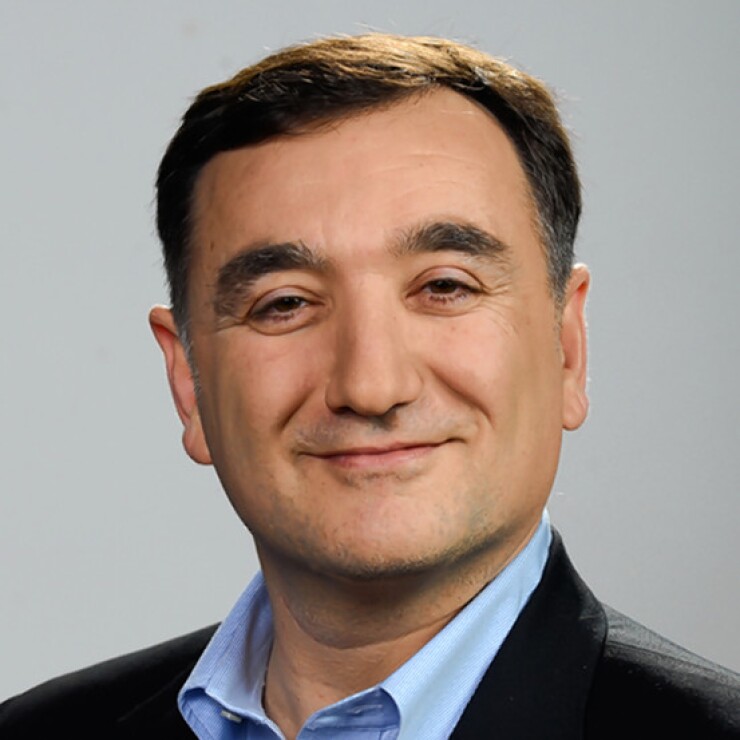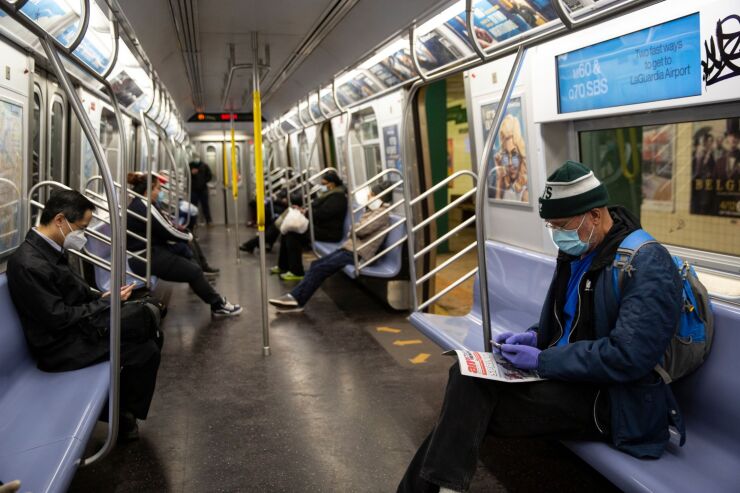Charles Day has never been closer to his clients — or farther apart.
Holed up in his Long Island home, the UBS financial advisor has been fielding a slew of client calls since the coronavirus outbreak started.
“I’m talking to them twice as much and for twice as long. But because it’s all on the phone, there is still some distance there,” Day says.
Has he seen a single client since the pandemic and lockdowns began?
“No, sadly. And I mean that. It’s sad. I’m such a social person and that’s why I’m doing so many phone calls. This is my circle,” Day says. “I turn 60 next year. If I had a birthday party next year, half [the attendees] would be clients.”
This is but one sign of how the pandemic has transformed advisors’ jobs — and in some cases their lives. Whether they’re with a big firm like Day, or a small RIA, advisors are settling into new work routines and adapting business strategies to a very different environment. Gone are coffee meetings and office banter. Also out the window: Meeting clients and prospects in person.
Here, four advisors from across the country and profession tell Financial Planning how they’re evolving their practices and lives to meet new challenges.
HELP WANTED — AND FOUND
Amid a pandemic, lockdowns and unprecedented volatility, advisor Evelyn Zohlen filled not one, but two open positions on her team.
Landing the right talent is a process — one she was reluctant to put on hold, Zohlen explains. “We found these candidates and we didn’t want to let them go and say, ‘Hey we’ll get back to you when this dies down.’”
Zohlen, the owner of Inspired Financial in Huntington Beach, California, had been looking to hire a financial planner and client service manager since November. The right candidates turned out to be out-of-staters.
“My planner moved here from Philly and the client service manager flew in yesterday from Boston,” says Zohlen, who is also chair for the FPA.

The hiring process had to overcome a number of challenges. For one, Zohlen was initially doubtful that she could interview or train potential candidates remotely. But, Zohlen says, she recognized the need to persevere.
“There is a leap of faith on both parties,” Zohlen says. “In our final interview [with the client service manager], I said ‘Let’s walk around the office.’ I used Facetime and showed her the office so that I could convey it’s beautiful Southern California, not a dank, dark business.”
Successfully hiring and training the newcomers, combined with her staff’s performance during a time of upheaval has been a boon, Zohlen says. “I’ve been surprised and reassured by the resiliency and ‘We can do this’ attitude by my team and my clients.”
‘I COULDN’T DO IT FOREVER’
At the onset of coronavirus, Charles Day’s phone wouldn’t stop ringing. He was having more than dozen long calls a day with clients. Work started before dawn. But as the pandemic has dragged on, Day settled into something of a new routine.
“In the beginning, I was up without the alarm at quarter to five, often talking with advisors who were also up at five in the morning. I eventually realized that I couldn’t do that forever,” says the Manhattan-based UBS advisor, who now works from home.
He’s recreated his work-life balance as best he can, getting up at 6, exercising and striving to end his day at about 5 PM. “I try to turn off the computer in the evening,” Day says.

Yet it’s difficult to adjust to not seeing his clients, many of whom live in the New York area. Though less than before, he’s still often on the phone or video conferencing with them.
“Such a big part of my job is psychology, and today it's an even bigger part,” he says, estimating that 80% of his conversations are simply about checking in to see how his clients are doing.
“It’s a lot about life beyond investing,” Day says. “Maybe it’s ‘Your kid just got into Brown, but maybe it’s a good time for a gap year?’”
He’s also taken to sending what he calls a “Good News” email on Fridays in which he shares something cheerful, such as a video of
“It’ll help clients remind them that I was there, checking in with them,” he says.
A CROWDED OFFICE?
While thousands of advisors have been learning to work remotely, George Papadopoulos is adjusting to a very different challenge: His office space got a lot more crowded.
The solo advisor has been working from home for roughly 20 years. But now, he shares that space with his daughter, adult son and wife.

“I kind of miss the quiet I had,” says Papdopoulos, laughing. He spoke from his bedroom because his wife was on a conference call downstairs.
Even as the Ann Arbor, Michigan-based advisor is seeing a lot more of his family, he’s seen a lot less of his clients — at least in person. He’s staying in touch via email and phone, but he’s not sure when they’ll meet again.
“As Dr. Fauci has said, it all depends on the virus. I hope the sooner the better. But I am thinking it might not be this year,” he says.
That same uncertainty about the future is playing out with his family. His daughter was due to start college in the fall, but Papdopoulos wonders if classes will be virtual. His son had come home from New York for what they expected was a temporary stay, but looks set to extend his stay in Michigan.
Still, the crisis has brought his family together in unexpected ways, Papdopoulos says. They’re sharing lunches and playing family trivia games.
“We never thought this would happen. My son had moved out when he went to college. So to have him back in the fold and playing games together when he’s an adult, that’s really nice,” Papdopoulos says.
‘REGULAR’ ROUTINES IN AN IRREGULAR TIME
Edward Jones advisor Kobby Okum strives to maintain his regular work routines, but “regular” has a different meaning these days.
For example, he’s still going into his office every day, which he can do safely thanks to Edward Jones’ policy of staffing branches with a single advisor and administrator. But the Mclean, Virginia-based advisor hasn’t seen a single client in-person for weeks.
“It’s just me and my administrative partner. It feels lonely without the clients,” Okum says.
Still, like UBS advisor Charles Day, he finds himself talking with his clients more than ever, albeit on the phone or via WebEx. He prefers the latter, he says.
“When you are talking with someone, you can see their smile. You can see their reception to the conversation,” says Okum, who serves approximately 150 households primarily in Northern Virginia.

He’s worried about how the coronavirus may change interactions. Will people start skipping hugs and handshakes, he wonders.
But for the time being, he’s staying focused and appreciating little things, such as his commute being cut down to just 15 minutes from 30. And he’s taking a more relaxed approach to work in one regard.
“We get to dress down a little bit more,” he says about office attire. “You might not catch me in a suit and tie every day right now.”






